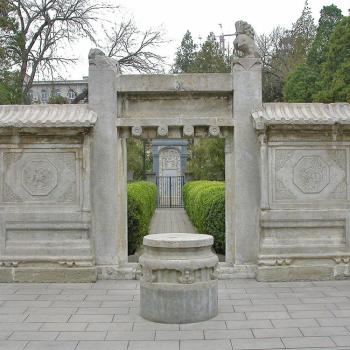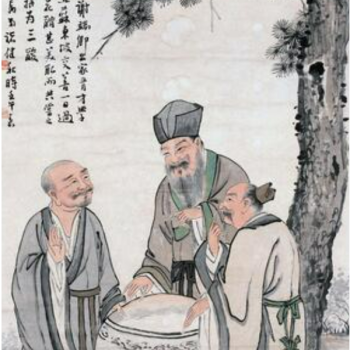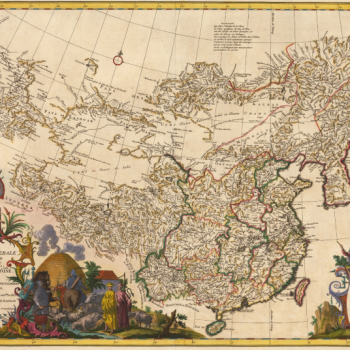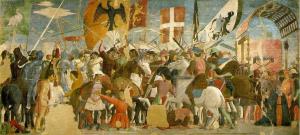
We ended last entry with a brief consideration of the remarkable anti-monarchist message that closes out the Pseudo-Methodian Apocalypse. That message is all the more remarkable because the Apocalypse of Methodius has been, unlike the New Testament apocalyptic tradition, stridently on the side of worldly power in general, and the Roman Empire specifically, since it began. The confidence that it has in the piety of the Roman Emperors and in God’s favor toward the Empire more broadly would have come as a shock to St. Paul or John of Patmos. And yet, despite this, Pseudo-Methodius carries within it the most effective challenge to the legitimacy of monarchy since the First Book of Samuel. There, God had shown His distaste for monarchal rule, taking the Israelite’s demand for an earthly king “like all the other nations” (1 Sam. 8:5) as a repudiation of His own rule over them, “they have not rejected you, it is I whom they have rejected, I whom they will not have to be their king” (1 Sam. 8:7). It is with this assessment that Pseudo-Methodius ultimately agrees. It portrays kingship as something invented by man, not by God, and applied first by “the nations” of Ham, Japheth, and Jonetos rather than by the chosen kingdom, whether that be Israel or Rome. And for history to reach its proper conclusion and all things set right, the royal sovereignty of the world that has been usurped by all kings must be returned to its rightful holder, God Himself.
Furthermore, Samuel’s warning to the Israelites that an earthly king would be a warmonger who “will take your sons and make them serve in his chariots and with his cavalry, and they will run before his chariot” (8.11) is borne out by the Pseudo-Methodian narrative. There, it is the elevation of the first kings, Nimrod and Pontipos, and the mutual animosity between them that sparks the first war, a war which further leads to other wars and sparks an endless cycle of one empire overthrowing another that the Pseudo-Methodian author recognized as still happening in his own day. Even the Last Emperor appears primarily as a warrior who institutes his great peace through conquest. And even that effort ultimately fails as the Last Emperor gives way to the Antichrist, who shatters his beautiful reign of peace and drives the world back into the cycle of chaos and bloodshed. Ultimately, the Emperor, just like every other king, is incapable of bringing lasting peace. Once again, it is only when sovereignty is returned to where it truly belongs, with God, and God’s rule over His people is restored that a lasting and eternal peace can finally become possible.
This explains why the Emperor often seems like no more than the puppet of an all-powerful deity, why he appears only when God needs him to fulfill his apocalyptic mission, and why he then dies as soon as the mission is fulfilled. But even as he degrades the concept of monarchy and renders the Emperor into a vessel of God’s will, it is clear that the author still has quite an affection for the Roman Empire and a great attraction to the majestic, unstoppable figure of the Last Roman Emperor that he has created. Thus, while the Emperor is rushed off stage in a scene that emphasizes God’s sovereignty and not his own, the remainder of the narrative, covering Antichrist’s reign and Christ’s return, is so brief and truncated that it is the Emperor’s final moments that stays with the reader afterward. There is a paradox at the heart of Pseudo-Methodius’s Last Emperor myth: it is an idea that requires its audience to enthusiastically affirm earthly monarchy while recognizing it as an affront to God that must be set right in the last age. This is a delicate balancing act, and one which later iterations of the Last Emperor narrative would not be able to undertake with the same level of delicacy and nuance.
It did not have to be like this. The Pseudo-Methodian prophet was probably always going to be caught between his allegiance to the Byzantine Roman Empire and his awareness that the Empire could not be allowed to survive if God’s plan was to come to fruition. He was stuck with the paradox. But he did not have to heighten the paradox by making the Last Emperor such a towering figure and his reign such a glittering moment in history. But that is what he did, turning the Emperor into the defining figure of the eschaton even as he portrayed him as a nameless instrument of God’s will. Surely the prophet’s desire to see a restored Byzantium and his belief in the nearing end of the world were not by themselves enough to justify the creation of a hero that almost blasphemously overshadows Christ. Where, then, did the Pseudo-Methodian prophet find the warrant for his addition of the Last Emperor into the apocalyptic narrative of Christianity?
He certainly did not find it in the other major (and more canonical) Christian apocalypse, that of John on the isle of Patmos. Pseudo-Methodius’s modern translator, Benjamin Garstad, notes that, “The Revelation of Saint John, for instance, is not mentioned at all; it was inconsistent with the very positive view of the Roman Empire espoused in the Apocalypse, and was in fact ignored by much of the Byzantine apocalyptic tradition” (Garstad xi). This is basically true, as far as it goes, but it should not be assumed from this that the Pseudo-Methodian author was unaware or entirely uninfluenced by the Book of Revelation. He includes the story of the two witnesses from Revelation 11 and even explicitly identifies them with Enoch and Elijah, as later Christian tradition had. And the Antichrist’s belonging to the tribe of Dan seems to be entirely based on the curious fact that Dan is omitted from the Twelve Tribes when they receive the seal of God on their foreheads in Revelation 7. Thus, the Pseudo-Methodian author clearly knew the canonical Apocalypse and was influenced by it even as he wrote his own, very different take on the end-times.
That being said, it is still true that Pseudo-Methodius never quotes the Book of Revelation and departs from it in several key details. But, if anything, it seems as though the Pseudo-Methodian prophet goes out of his way not to quote Revelation, twisting other verses into apocalyptic knots in order to justify the twists and turns of his narrative. Hence, his favorite Biblical phrase, “Ethiopia shall stretch forth her hands toward God,” is made to do a considerable amount of work that it was never meant for, providing the Biblical justification for both the notion of the Roman Emperors’ Ethiopian descent and the final scene of the Emperor’s surrender of authority to God and death at Golgotha. And some of the details of his narrative seem designed specifically to contradict those of Revelation, such as when “the nations” “flee from him [Antichrist] and adhere to those just men” (Pseudo-Methodius 14.12) after hearing the two witnesses preach, despite the fact that Revelation has “all the kings of the world” (Rev. 16:14) follow the Antichrist down to defeat at Armageddon. The Pseudo-Methodian prophet is not trying to avoid or ignore Revelation. He is actively offering a competing vision of the last days of the world that he feels has more authority than the Revelation of John.
There are, of course, many reasons that he would want to challenge the Book of Revelation. Revelation is resolutely suspicious of kings and of earthly authority in general and downright hostile to the Roman Empire in particular. Rome, the Babylon of the Apocalypse, is roundly denounced in its pages and the Empire’s inevitable destruction is presented as a joyous affair to be met with jubilation by the faithful. Pseudo-Methodius agrees that the Empire’s destruction is inevitable, but portrays it as a tragic thing that is not to be celebrated, even if it is necessary within God’s greater historical plan. But there is something else about the Book of Revelation that would make it distasteful to the Pseudo-Methodian prophet, namely, the fact that it insists strongly on Jesus as the sole messiah of the last days. Indeed, the depiction of two Antichrists, one being the kingly Beast and the other the false prophet whose preaching bolsters his rule, reads like a direct parody of the two-messiah theory that groups like the Essenes espoused and that Pseudo-Methodius essentially argues for, albeit in a modified form. Thus, for Pseudo-Methodius, Revelation could only ever be a foe, one that had to be supplanted if this new, Christian form of the two-messiah theory was to earn to gain credence among the faithful.
But this still leaves unanswered the question of why Pseudo-Methodius is so committed to the idea of a second Christian messiah, even to the point of directly breaking with a canonical (albeit never unchallenged) book of the Bible. But perhaps the answer can be found in the same place where the two-messiah theory—and indeed, the concept of the messiah itself—originated: Jewish apocalyptic thought. Paul J. Alexander, a leading scholar of the Last Emperor myth, proposes in his 1978 article, “The Last Roman Emperor and Its Messianic Origin” that the Last Emperor is a deliberately Christianized version of the Jewish idea of the royal Messiah of David. As Alexander puts it, “In a vague way it has long been recognized that the medieval concept of the Last Roman Emperor had its roots, at least partially, in Jewish Messianism. What has not been clearly realized, however, is that not only isolated details of the concept but most of its essential characteristics reproduce Late Jewish hopes for a national liberator, a Messiah” (Alexander 6). Alexander suggest that the Emperor’s seeming lack of a personal identity, his sudden appearance, his residency in Jerusalem, and his role as militant conqueror of the faith’s enemies are all elements provided by the original Jewish conception of the messiah.
Alexander also proposes that the Emperor’s peaceful reign itself has roots in the Jewish understanding of the messianic age. As he notes, “Pseudo-Methodius imagines it [the Emperor’s reign] as a period in which the King and his people enjoy all sorts of divine blessings that at times border on the miraculous, but still form part of human history during which familiar institutions (kingship, warfare, Jerusalem, Palestine, etc.) continue to exist” (7-8). In short, this is something far more like the Jewish messianic era than the Christian millennium. In Alexander’s reading, the Emperor’s reign fulfills the exact same function as the Jewish messianic age, acting as a final era of this-worldly peace and contentment before God finally remakes the universe as the “new heaven and new earth.” Since this was also the basic function of the Millennium in Christian thought, Alexander believes that Pseudo-Methodius intends for there to be no Millennium when Christ returns. This means that the Emperor has taken the place of not only the Jewish Davidic messiah but of Christ himself, displacing both of them as the near-divine ruler of the final, paradisial period in human history.
This is a fascinating, provocative idea. It seems to find support not only in the descriptions of the abounding peace of the Emperor’s reign, so clearly reminiscent of Jewish messianic literature, but also in the Pseudo-Methodian prophet’s conviction that he was living near the close of the seventh millennium. For in more traditional Christian thought, the seventh millennium was the Millennium, when Christ would rule on earth with his saints, and thus was properly outside of history. By putting himself at the end of the seventh millennium instead, Pseudo-Methodius has allowed no time for Christ’s thousand-year reign but provided ample room for the Emperor’s much shorter one. Still, it must be noted that nowhere does Pseudo-Methodius say that Christ also will not enjoy a thousand years of personal rule on earth, meaning that its author could also be imagining as many as three paradisical periods at the end of history.
But regardless, what Alexander says about the messianic character of the Emperor’s reign is highly persuasive. His argument that the Emperor displaces Christ, to an extent, as messiah finds support in a number of Biblical passages that originally pertained to God and Christ but are reapplied by Pseudo-Methodius to the Emperor. Alexander notes that this prophet takes the phrase “[t]he Lord was aroused … like the man who shakes off the effects of wine” (qtd. in 4) from the 78th Psalm and replaces God with the Emperor to conjure the image of his sudden appearance and that he “dare[s to] apply Jesus’s prediction about the material prosperity under the risen Christ to the Last King” (5). Furthermore, while Alexander does not notice it, the text cites the verse from Second Thessalonians in which ‘the Son himself shall have surrendered the kingdom to His God and Father’ (Pseudo-Methodius 10:3), but then has the Emperor, rather than Jesus, perform the act of surrender. In that moment, the Emperor fully usurps Jesus’s role and is apparently supposed to be understood as the “Son of God” in some sense, a title Christians reserve for Jesus Christ alone. This establishes a kind of equality and metaphysical equivalence between Christ and the Emperor that borders on the blasphemous. They are, at least in their respective roles, supposed to be seen as equals.
This again recalls the two-messiah theory, with a spiritual messiah and a militant, royal messiah holding roughly equal rank and importance. This is the messianic idea found in the Dead Sea Scrolls. As I have mentioned before, it is not impossible that Pseudo-Methodius was influenced somewhat by the scrolls, as caches of scrolls were discovered from time to time in the first millennium A.D. and promptly dispersed across the greater Levant. Alexander wonders about how a relatively uncontaminated notion of the Jewish messiah could have reached Pseudo-Methodius and offers various explanations, none all that convincing. That an uncovered scroll from the Qumran sect could have stumbled into the prophet’s possession offers a potentially more satisfying answer. It would certainly explain not only the Last Emperor’s Davidic traits but why the Pseudo-Methodian prophet thought such a figure could possibly co-exist with the messiah whose singularity is one of the bedrock doctrines of the Christian faith.
That being said, one knock against Alexander’s theory is that the Pseudo-Methodius never links the Last Emperor to David. Indeed, as with his use of Revelation earlier, the author seems intent on avoiding any such connection. Thus, the Israelite monarchy plays no part in the grand intermixture of national bloodlines that produces the Roman imperial dynasty. Israel is barely mentioned at all across Pseudo-Methodius’s history of the world. There is no attempt, as there sometimes would be elsewhere, to link the Roman Empire to the Davidic monarchy, either physically or spiritually. David himself is only mentioned as the author of the Psalms; the Pseudo-Methodian prophet cites him when quoting his favorite verse, “Ethiopia shall stretch forth her hands toward God.” On the only occasion when Pseudo-Methodius looks to imply a comparison between the Last Emperor and an Israelite ruler, he does not turn to David. Rather, he offers Gideon the judge of Israel as a model for the Emperor’s messianic role instead (5:6-7). Despite the fact that he otherwise seems confident in making the Emperor the kind of warlike, conquering messiah the heir of David was supposed to be, this prophet seems very much intent on not identifying him with David’s messianic heir.
There are many possible reasons for this. One is that Christian doctrine established Jesus as the Davidic messiah and, however much the Pseudo-Methodian prophet was willing to transfer the attributes and role of the Messiah of David to the Last Emperor, actually transferring the name and title away from Jesus might have been a bridge too far. Or perhaps it has something to do with the undercurrent of antisemitism running through the work. The Antichrist has been reimagined as Jewish here—an idea which had a disastrously long reach in Christian Europe—and perhaps Pseudo-Methodius wants to sharpen the contrast between his Roman messiah and the now-Jewish Antichrist. (Incidentally, this would allow him to once more turn the tables on the Book of Revelation, which had offered a Jewish messiah in Christ and a Roman Antichrist.) Or perhaps the Pseudo-Methodian prophet simply needed more freedom to fit his ideal Emperor into the messianic mold than an identification with David’s long-awaited progeny would have allowed. But, whatever his reasons, it is clear that the author of Pseudo-Methodius was not content to simply important the Davidic messiah from Judaism. That he found at least some inspiration in the Jewish messiah concept seems hard to deny, but he thoroughly transformed the idea into something more appropriate for his own place and time, something that appealed to Christian and pro-Roman sensibilities in a way that the messianic ideal embodied in Christ did not.
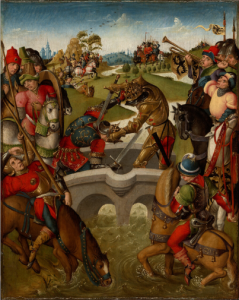
For his work did strike a chord. This strange and imaginative vision of the end, with its flagrant misinterpretation of Biblical verses, peons to the glories of imperial rule, and potentially blasphemous ideas was not shunned by the general body of the Church. Instead, Christians for the most part embraced the Apocalypse of Methodius with open arms. Before the seventh century was out, it had already been translated into both Greek and Latin and had spread to every conceivable corner of Christendom. Garstad testifies to its incredible popularity: “The influence of the Apocalypse of Pseudo-Methodius throughout the Christian world was immense … The Byzantine apocalyptic tradition was irrevocably transformed by Pseudo-Methodius … In the West, the Latin Apocalypse is represented by a manuscript tradition that rivals the classics and the Church Fathers in its extent” (Garstad ix-x). It became, for the next several centuries, the guidebook to the apocalypse for Christians, while the Book of Revelation itself fell into relative obscurity.
This indicates that the dissatisfaction that the Pseudo-Methodian prophet felt toward Jesus as the Davidic messiah was shared—though of course no good Christian would have admitted it—throughout Christendom. While the fact of Jesus’s lordship and the redemptive power of his death on the Cross were never questioned, these things in themselves were not enough to make up for the loss of the traditional conception of the Davidic messiah as a warrior who overcomes the faith’s foes in battle, a king who rules over a time of national revival and boundless material prosperity, and a hero who brings perfection to old spaces and institutions rather than dissolving them entirely. Jesus had never become this kind of leader during his earthly career. And his future return promised not so much the fulfillment of any of these roles as an experience so transformative that it would make all the old conceptions obsolete. But the older conceptions had an undeniable appeal and were, at any rate, easier to visualize and understand. The completely transformative nature of Jesus’s messiahship in Christianity, the way it knocks down (or should knock down) all the old boundaries and conventions, is often cited as its most appealing aspect. This may well be true, but it seems that what people have often hungered after is for the things of the present earth to be given a new vibrancy and meaning rather than replaced by a new and different world. In short, they have hungered for a renewal rather than a remaking.
This certainly seems to have been the attitude amongst medieval people. They may have accepted the canonicity of the Book of Revelation but its otherworldly sense of salvation was a nonstarter, as was Augustine’s attempt to interpret the book as an allegory of the Church’s present reign. Medievals wanted the transformation and purification of the world and they wanted it to come at the hands of recognizable figures in the socio-political order. Most of those who expressed faith in the Last Emperor probably did not conceive of it a holdover from Jewish messianism or as a challenge to Christ’s own role as savior. But the fact that so many so readily adopted a figure so uncannily similar to the Jewish conception of the future Davidic king suggests that the basic idea provided something that Christians found lacking, consciously or unconsciously, in their own messiah. That this was no mere blip in the grand tradition of Christian thought, a brief moment of collective weakness, is demonstrated by how long Pseudo-Methodius held sway over the Christian mind. It was only when Joachim of Fiore came along in the twelfth century and managed to draw out his own version of the things of this world transformed and renewed from the Book of Revelation that Pseudo-Methodius’s hold began to weaken and Revelation’s revive. That being said, Pseudo-Methodius did not cease to be commonly read for a long time and when it finally did, it had long since reshaped the eschatological beliefs and convictions of the Christian faith at large.
This is important to note. Pseudo-Methodius is a text that must inevitably seem strange to us, a work whose convictions and expectations are so entirely different from our own. I would imagine that few today expect a resurgence of the Roman Empire, much less look toward the possibility with hope. And the antisemitism and Islamophobia that emerge from Pseudo-Methodius’s narrative are deeply troubling in and of themselves. But the desire to see the earth and human society reinvigorated with justice while retaining their basic character as our earth and our society is very much with us still. And the rapid decline of Christianity in the West, especially among young people concerned with achieving justice on this earth, suggests that the discontent with Jesus as the transcendent, world-remaking messiah is also still very much with us. Whatever else may be said about the Pseudo-Methodian prophet, he offered an antidote to that dissatisfaction that suited his own times. Christians today will probably find the Last Emperor much less useful. But the need to answer that discontent in a voice matched to the times remains the same. As we watch the churches flail in the face of alienated youth and increasingly empty pews, however, we have to wonder: do Christians have such an answer available to them today?
But while Pseudo-Methodius certainly deserves the credit for establishing what would become the standard form of the Last Emperor myth, this text did not convince Christian Europe to rally behind the figure of the great future monarch all on its own. It had help from another highly influential medieval work, the Latin version of the Oracle of the Tiburtine Sibyl, that offered a parallel account of the Last Emperor and his reign. To this we shall turn in our next entry.
Works Cited
My source text remains that found in Apocalypse Pseudo-Methodius / An Alexandrian World Chronicle, edited by Benjamin Garstad (Cambridge: Harvard University Press, 2012). All translations from the Latin are, again, mine. My citations of Garstad are to his introduction in this same volume.
Other texts cited are:
Alexander, Paul J. “The Last Roman Emperor and Its Messianic Origin.” Journal of the Warburg and Courtlauld Institutes, vol. 41 (1978): pp. 1-15. [An online edition of this paper can be found at https://www.jstor.org/stable/750860.]
The First Book of Samuel. The Oxford Study Bible, edited by M. Jack Suggs, Katharin Doob Sakenfeld, and James R. Meuller. New York: Oxford University Press, 1992. 277-310.
The Revelation of John. The Oxford Study Bible, edited by M. Jack Suggs, Katharin Doob Sakenfeld, and James R. Meuller. New York: Oxford University Press, 1992. 1556-1575.



